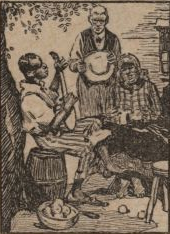Negro Rhymes and Melodies.
Songs of the Old Plantations.By Francis Gribble.
[On Monday, January 19th, there will be broadcast from Birmingham an Old Time Nigger Minstrel Programme. Although music of this class differs considerably from the real plantation melodies, it is to a large extent founded on them. In the following article Mr. Francis Gribble gives some interesting facts about the real Negro Songs and "Spirituals."]

The origin of Negro songs and "spirituals" is lost in the mists of antiquity. One "specs" they "growed" (like Topsy), first in Africa and then in the plantations; for affinities have been traced between the airs and those still to be heard in Abyssinia, while the words, whether sacred or secular, are quite different from any ever used by any of the subjects of the Negus.
For a long time it was only on the plantations that they were heard. There Mammy sang her little Alabama coon to sleep, and the labourer eased the burden of his day's toil with chaunties, and the "converted" relieved their souls with pious doggerel, and the rhythmical clapping of hands recalled the beating of the tom-tom in the dark forest; but leas than a century has elapsed since it first occurred to anyone that here was the material for a new kind of platform entertainment.
Sung by Gladstone.
Dan Rice was the pioneer. He "presented" Negro minstrels, for the first time, in or about the year 1835. They created a furore, first in the Eastern States, and then in England, reaching our shores at the time when Gladstone was a young man, and it is recorded in the gravest of the biographies that Gladstone sang some of their ditties at evening parties, and was particularly famous for his rendering of the one which begins:—
Camptown ladies, sing a song:
Dooh dah, Dooh da!
Camptown race course five miles long:
Oh, dooh da day!
Other songs not less popular, though not, so far as one knows, sung by the Grand Old Man, were "Coal Black Rose," "Sich a Getting Upstairs," "Dandy Jim from Carolina," and, shove all, the song of which the refrain was to pass into the language of the people:—
Wheel about, and turn about and jump just so:
Every time you wheel about, you jump Jim Crow.
After the Civil War.
The vogue of the sacred melodies came later. Attention was not drawn to them until after the Civil War and the abolition of slavery; but they then played their part—and no specially modest part either—in the task of reconstruction.
The Negro was now to be educated, and funds for Negro universities were scarce. It occurred to a wise man that Negroes might very well sing for their endowments; and they did on with remarkable success.
The Jubilee Singers from Fisk University, Nashville, Tennessee, came north, and gave sacred concerts, raising more than 150,000 dollars for that excellent seat of learning. The melodies established themselves so firmly that Dvorak, the Czech composer, when director of the National Conservatory of Music in New York, introduced some of them into his own compositions.
Unwritten Songs.
By that time, however, American Negro music had undergone considerable transformation. The old and the new in it cannot be sharply separated; but some of the factors in the evolutionary process can be traced. The "spirituals" with which we start are crude things, defined, in an excellent article about them by Marion Alexander Haskell, as "religious songs composed by the Negroes themselves, never written or printed, but passing from one generation to another, with such additions and variations as circumstances may suggest."
Their character changed as the Negro, becoming educated, became self-conscious. He is imitative and responsive to cultural influences. The influence of the hymns introduced by Methodist revivalists was succeeded by that of church music of a better character; while, at the same time, the old-fashioned Negro music was deliberately imitated by American composers trained in the European traditions. Present-day American Negro music is the resultant of these conflicting forces.
Borrowed Lines.
And these influences can be discerned in the words no less than in the airs. One detects modernity, and even plagiarism, in a typical sacred song printed in W. J. Linton's collection. It begins on the simple lines of the "spiritual" of old plantation days:—
God got plenty o' room, got plenty o' room,
'Way in de kingdom;
God got plenty o' room my Jesus say,
'Way in de kingdom.
But then, after an interval, we come to lines which the plantations certainly did not originate:—
Old Satan tremble when he sees
The weakest saints upon their knees.
That is sophisticated and borrowed. One is nearer to the simple original unsophisticated thing in such lines as these, taken from the same authority:—
I cannot stay in hell one day,
Heav'n shall be my home;
I'll sing and pray my soul away,
Heav'n shall be my home.
Or these:—
Nobody knows de trouble I've had,
Nobody knows but Jesus;
Nobody knows de trouble I've had;
(Sing) Glory, hallelu!
![]()
This work is in the public domain in the United States because it was published before January 1, 1929.
The longest-living author of this work died in 1946, so this work is in the public domain in countries and areas where the copyright term is the author's life plus 77 years or less. This work may be in the public domain in countries and areas with longer native copyright terms that apply the rule of the shorter term to foreign works.
![]()
Public domainPublic domainfalsefalse